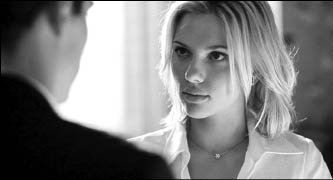Next story: moe.
New Growth in Old Wood[y]: Match Point
by M. Faust

Most of you who go to see Match Point will do so in the knowledge that it is a new film by Woody Allen. Some will go because of that, maybe a few in spite of it. A lot of people will also avoid it for that reason, including people who use to count themselves among his fans. I sympathize: certainly nothing he has made since 1999’s Sweet and Lowdown has given us much hope to expect anything other than increasingly tired reworkings of his older films from the new ones that he continues to grind out on a yearly basis.
Here’s what you do. Keep your eyes closed during the 30 or 40 seconds while the opening credits (done in the same familiar white-on-black style he’s adhered to for thirty years) are on screen. After that, forget that you’re watching a Woody Allen movie. It won’t be hard to do: a passing reference to Strindberg is about the only thing it has in common with the ossified Allen style. And you’ll be glad you did, because Match Point is a shining example of what may be Hollywood’s most endangered species, an intelligent gimmick-free drama.
What’s that you say? A drama? I understand your trepidation. Allen has not exactly done his best work when he turned away from comedy. Films like Interiors, September and Another Woman were all too obviously the work of a man desperate to escape his reputation as a clown, yearning to be taken as seriously as the dour filmmakers and playwrights he most admired. Better that he work his concerns about the meaninglessness of life into the context of a comedy.
Allen has a lot of cause to be satisfied with Match Point. But one of the biggest reasons is that it provides a kind of key for many of his earlier movies, a light on meanings that may have escaped viewers who wanted to believe that his serious concerns were simply a comic tool.
Set and filmed in London, Match Point is the story of Chris Wilton (Jonathan Rhys Meyers), a former tennis pro who has decided that he doesn’t have the kind of drive and ambition it takes to succeed in that game. In an introductory narration, he tells us that life is far more dependent on luck than most people want to admit. It’s like a tennis ball in play that hits the top of the net and hangs in the air for a split second: if it goes one way you win, the other way you lose.
Taking a job as a tennis instructor, Chris meets and befriends Tom Hewett (Matthew Goode), son of a rich industrialist. Tom is his guide into a life of comfort and security. He introduces Chris to his family, who take a liking to him, especially sister Chloe (Emily Mortimer), who sees Chris as husband material. Tom also introduces him to his own fiancée Nola (Scarlett Johansson), a struggling actress of whom Tom’s family disapproves.
Chris likes Chloe, loves her, marries her. He’s taken into the family firm and slides up the ladder to success. But he has an unshakeable lust for Nola, one both of them know can come to no good end.
That may sound like the stuff of a James M. Cain novel, and Allen is certainly playing with the conventions of film noir. When Chris first spots Nola beating Tom at the ping-pong table, she gives him a sultry smile and asks, “So who’s my next victim?” Aha, we think, we know this story. Barbara Stanwyck and Fred MacMurray in Double Indemnity, perhaps; the femme fatale and the amoral sap she leads around by his prick.
One of the things that makes Match Point so satisfying is that Allen has written a story that comes from that somewhat hackneyed tradition yet manages to surprise us. In fact, he surprises us twice. He draws out the genre conventions in unexpected ways, culminating in a sequence that is surprisingly and genuinely suspenseful. Then, just when we think that he’s given up his film’s theme for the sake of a good story, he pulls it back, revealing that this is after all a story about luck, something that cuts in two directions. At the age of seventy, Allen more than ever believes that we live in a cold, indifferent universe. Of course, he has always expressed that belief, but if in his other films we wrote it off as the neurotic whinings of a professional nebbish, this time we believe him.
Match Point is the first film Allen has directed outside of his native Manhattan, a city with which he had come to be almost inextricably identified, and the change has done him a world of good. Gone are just about all of the tics and bits of business that had come to dominate his films; gone are the performances that sound like they’re trying to imitate Allen’s voice. Despite being a bit on the long side (a few minutes over two hours), this is a tightly written, keenly focused film, with no unnecessary asides or subplots.
Allen has already completed a second film in London, and has signed a contract to make one next year in Barcelona. On the basis of this film, I hope he never comes back.
|
Issue Navigation> Issue Index > v5n3: Kerchung! You Lose! (1/19/06) > Film Reviews > New Growth in Old Wood[y]: Match Point This Week's Issue • Artvoice Daily • Artvoice TV • Events Calendar • Classifieds |









 Current Issue
Current Issue